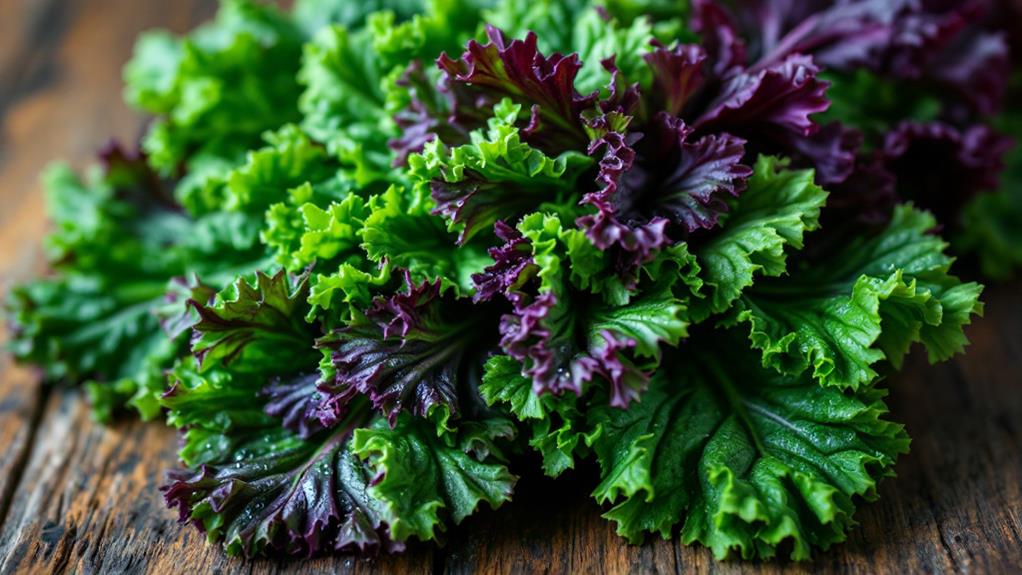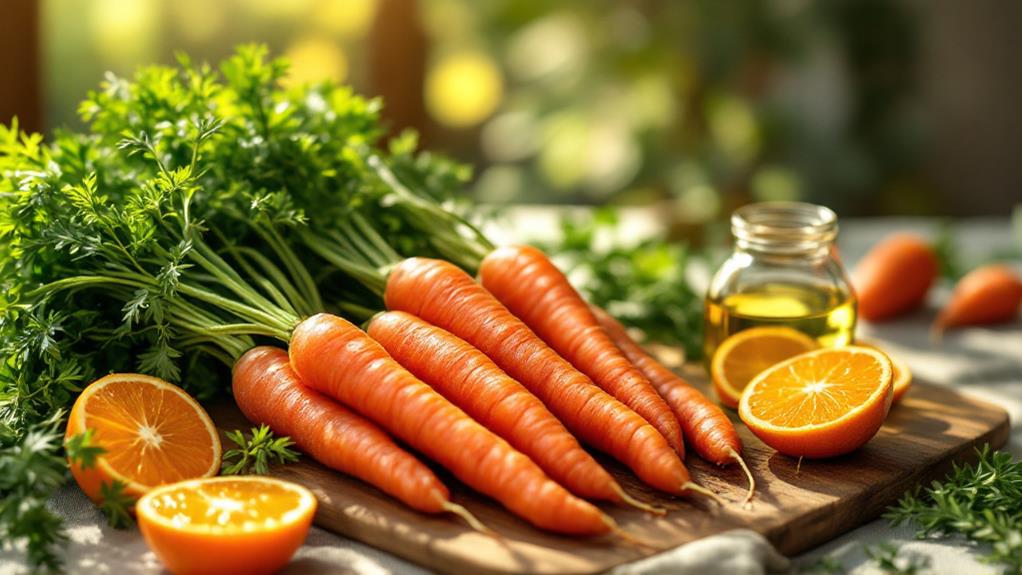The Nutritional Value of Shallots: A Flavorful and Healthy Addition
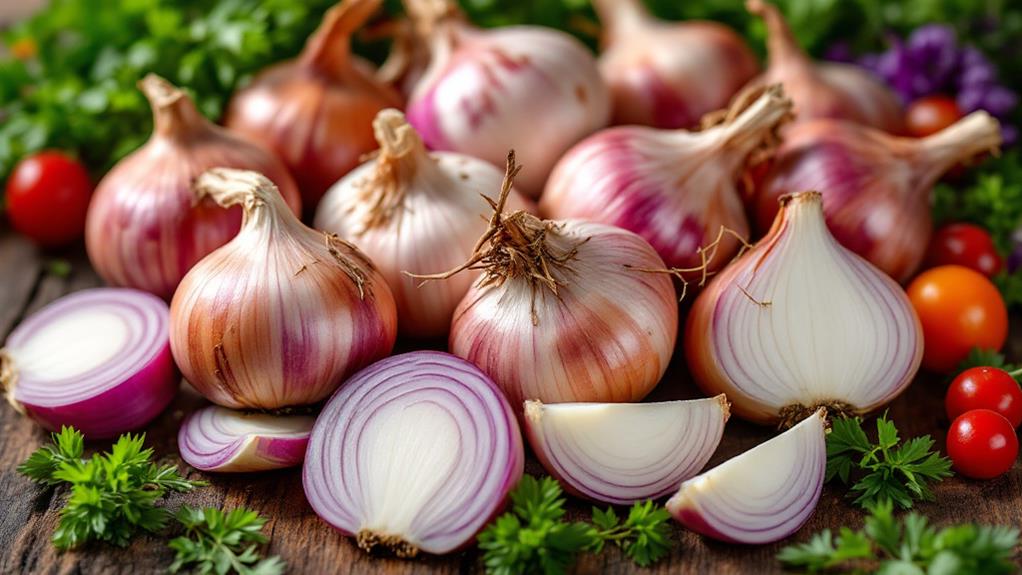
When you add shallots to your meals, you're not only enhancing flavor but also improving nutrition. These small bulbs contain just 72-75 calories per 100 grams, while packing in vitamins A, B6, and C, along with crucial minerals and 3 grams of fiber. Rich in antioxidants like quercetin, shallots support heart health by stabilizing blood pressure and lowering cholesterol. Their antimicrobial properties protect against infections, while their anti-cancer compounds aid in cancer prevention. Shallots are deliciously versatile in your cooking, perfect for everything from fresh salads to savory roasts. Uncover the full range of benefits that shallots offer in your diet.
Nutritional Profile of Shallots
Shallots pack a punch regarding nutrition. When you add shallots to your meals, you're elevating their nutritional value considerably. Each 100 grams of shallots contains about 72-75 calories, which makes them a light yet nourishing supplement to any dish. They offer 2.5 grams of protein and 17 grams of carbohydrates, providing you with the energy your body needs. Beyond macronutrients, shallots are a powerhouse of vitamins, especially A, B6, and C, which play vital roles in maintaining your complete health.
Incorporating shallots into your diet also means you're getting a good dose of key minerals. With 3% of your daily calcium, 7% iron, and 5% magnesium needs met per 100 grams, these minerals support multiple bodily functions, including bone health. Shallots are rich in antioxidants like quercetin and organosulfur compounds, which help protect your cells from oxidative stress.
Their high fiber content, about 3 grams, is excellent for digestive health. It assists in maintaining a healthy weight by improving satiety. In short, shallots are not just a flavor enhancer—they're packed with nutrients that contribute to your complete well-being.
Health Benefits Overview
Embracing the health benefits of shallots can greatly improve your well-being. These flavorful bulbs are packed with antioxidants like quercetin and organosulfur compounds, which play a vital role in reducing inflammation and oxidative stress. By incorporating shallots into your diet, you can help lower your risk of heart disease. Their organosulfur content improves blood circulation and reduces cholesterol levels, promoting a healthier heart.
Shallots are also a powerhouse for immune function, thanks to their high vitamin C content. Regular consumption can bolster your immune system, potentially reducing the frequency of colds and infections. The important vitamins and minerals found in shallots, including potassium, folate, and vitamin B6, contribute to your general health and well-being, ensuring your body gets the nutrients it needs to function at its best.
Beyond these health benefits, shallots possess antimicrobial properties that may help alleviate allergy symptoms and combat respiratory infections. This makes them an excellent supplement to your diet for immune support. By adding shallots to your meals, you're not just enhancing flavor but also fortifying your body with important nutrients that support long-term health.
Cancer Risk Reduction
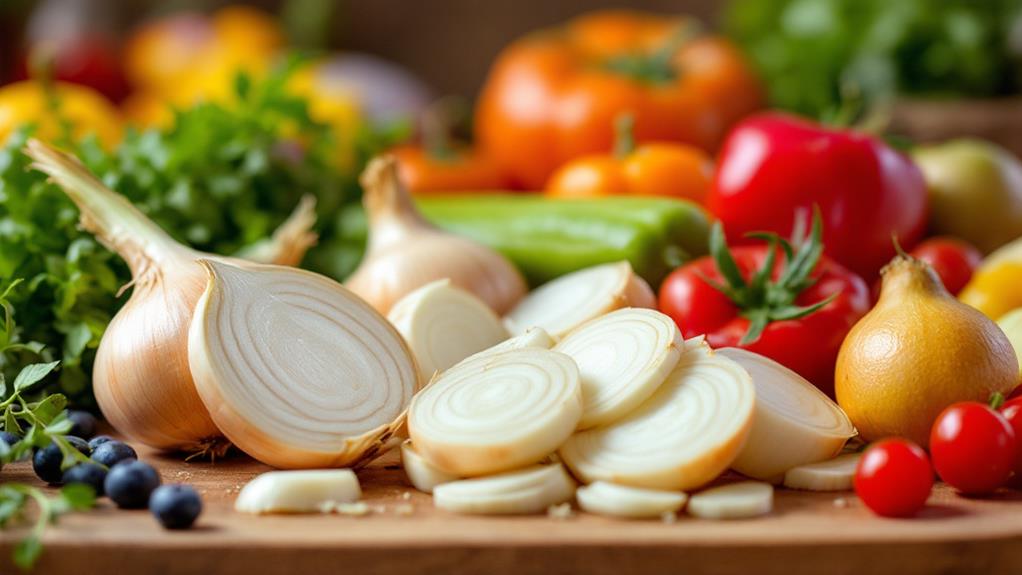
Reducing cancer risk can be achieved by incorporating shallots into your diet, thanks to their impressive anti-cancer properties. Shallots, part of the allium family, have been praised for their cancer-fighting effects. Their ethyl acetate extracts have demonstrated the ability to slow down cancer cell growth, pointing to their potential anti-cancer properties. Regularly consuming shallots may also lower your risk of stomach cancer as they're packed with antioxidants and anti-inflammatory compounds. These components work in harmony to combat oxidative stress, a known contributor to cancer development.
Furthermore, shallots contain immune-boosting peptides that improve your body's defense mechanisms against cancer. By helping to neutralize free radicals, they reduce the oxidative stress that can lead to cancer cell formation. Another key player in shallots' cancer risk reduction profile is their high sulfur compound content. These compounds support detoxification processes, helping your body rid itself of harmful toxins that could potentially lead to cancerous changes.
Incorporating shallots into your meals not only enriches your dishes with flavor but also provides a natural and effective way to bolster your body's defenses against cancer. Enjoy the benefits of this delicious and healthful enhancement to your diet!
Heart Health Support
How can you improve your heart health naturally? Incorporating shallots into your diet might be the flavorful solution you've been searching for. These little bulbs pack a punch regarding nurturing your heart. They're loaded with antioxidants like allicin and quercetin, which stabilize blood pressure and fend off free radical damage, enhancing your comprehensive heart health.
Shallots are rich in organosulfur compounds that lower cholesterol levels and elevate circulation. This contributes considerably to cardiovascular wellness and helps keep heart disease at bay. Regularly eating shallots supports healthy blood vessel dilation, allowing your cardiovascular system to function efficiently. This can reduce the risk of heart-related ailments.
For those with diabetes, shallots offer supplementary heart health benefits. A diet rich in these bulbs considerably lowers cholesterol and triglyceride levels, particularly in women, providing extra protection for at-risk populations.
Here's how shallots can support your heart:
- Stabilize blood pressure: Antioxidants help maintain steady blood pressure.
- Lower cholesterol: Organosulfur compounds reduce cholesterol levels.
- Improve circulation: Elevates blood flow for cardiovascular wellness.
- Support vessel dilation: Promotes healthy blood vessel function.
- Heart disease prevention: Regular consumption reduces heart disease risk.
Brain Health Improvement
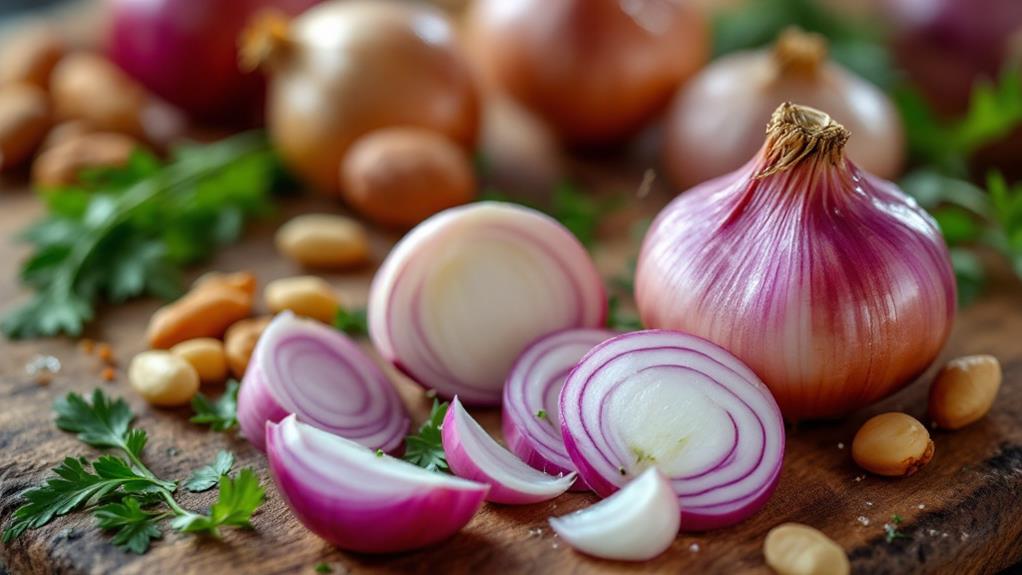
When you're aiming to improve your brain health, shallots might just be the ingredient you need. Rich in folate, shallots play a significant role in promoting brain function and protecting DNA/RNA integrity. Folate is vital for maintaining cognitive function, which helps stave off cognitive decline. Shallots are also packed with antioxidants like quercetin, which combat oxidative stress—a major factor in brain health issues.
The anti-inflammatory properties in shallots offer further benefits. By reducing inflammation, they may help prevent Alzheimer's and other neurodegenerative disorders. Pyrithione, a compound in shallots, specifically targets brain inflammation, improving neurological health. This makes shallots a valuable ally in maintaining a healthy brain.
Regularly incorporating shallots into your diet can also support mental well-being through the regulation of neurotransmitter activity. This can lead to reduced stress and less nervous irritability, contributing to a more balanced state of mind.
Incorporating shallots into your meals is a flavorful way to support brain health and combat the factors that contribute to cognitive decline. Their natural compounds work together to improve and protect your brain, keeping you sharp and healthy.
Antimicrobial Properties
Beyond their contribution to brain health, shallots also possess remarkable antimicrobial properties that can bolster your extensive well-being. Thanks to the organosulfur compounds present in shallots, they're effective against a wide range of bacteria, fungi, and viruses. These compounds play a significant role in combating microbial infections, making shallots a flavorful and healthy supplement to your diet.
Regular consumption of shallots can help soothe respiratory allergies and infections. Their antibacterial effects make them a key ingredient in traditional remedies for common colds and flu, offering natural relief from viral infections. Incorporating shallots into your meals not only improves flavor but also supports your immune system in fighting off these common ailments.
Even your oral health can benefit from shallots. Flossing with shallot extract has been shown to inhibit oral bacterial growth, promoting a healthier mouth. Here are some significant benefits of incorporating shallots into your routine:
- Combat bacteria, fungi, and viruses with their antimicrobial properties.
- Soothe respiratory allergies naturally with regular consumption.
- Relieve common colds and flu through traditional remedies.
- Improve oral health by reducing bacterial growth.
- Boost your immune system with a flavorful and healthy supplement.
Culinary Uses
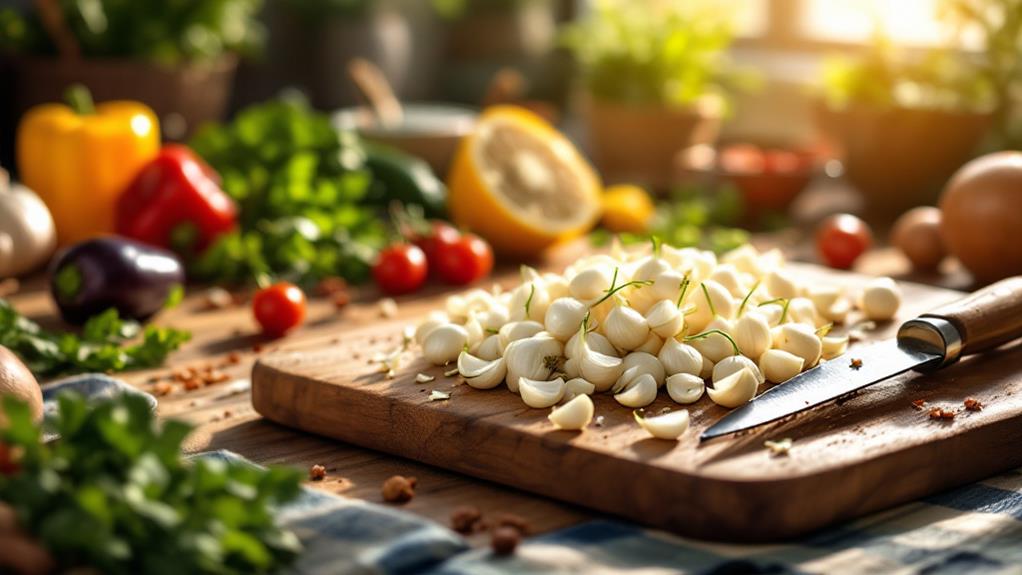
In conjunction with their health benefits, shallots are a culinary delight that can improve your cooking with their subtle sweetness and mild flavor. These versatile bulbs are a staple in French cuisine, ideal for delicate dishes like vinaigrettes, sauces, and soups. Their mild flavor won't overpower, allowing the other ingredients in your dishes to shine. You can roast, sauté, or pickle shallots to add depth and nutrition to meals, from meats to salads. When diced raw, shallots provide a fresh, crunchy alternative to onions in salads, bruschetta, and pasta dishes.
Caramelized shallots are another way to enjoy their rich flavor. Cooking them slowly brings out their natural sugars, perfect for savory dishes like quiches and gratins. The caramelization process amplifies their subtle sweetness, making them a delicious supplement to your culinary repertoire. Shallots' versatility also means they can replace onions in many recipes. Just remember to adjust quantities to make sure the flavor remains balanced. By incorporating shallots into your kitchen, you're not only elevating the flavor of your dishes but also adding a nutritious element that supports a healthy diet.
Storage and Preservation
Proper storage and preservation of shallots can greatly extend their shelf life, guaranteeing you always have fresh ingredients on hand. To maintain their freshness, store shallots in a cool, dark, and well-ventilated area. Ideally, you'll want to keep them at temperatures between 50-70°F (10-21°C). This setup helps prevent sprouting and spoilage, preserving both their nutritional value and flavor. Avoid exposing shallots to moisture and check them regularly for any soft spots or mold.
When you need to store cut shallots, refrigerate them in an airtight container. This method guarantees they stay fresh and flavorful for 7-10 days. For long-term storage, consider freezing shallots. While freezing preserves their nutritional value, be aware that their texture might change once thawed. Here are some quick tips to keep in mind:
- Store in a cool, dark, and ventilated area.
- Refrigerate cut shallots in an airtight container.
- Check regularly for mold or soft spots.
- Freeze for long-term storage but expect texture changes.
- Sprouted shallots can still be cooked and enjoyed.
Shallots vs. Onions
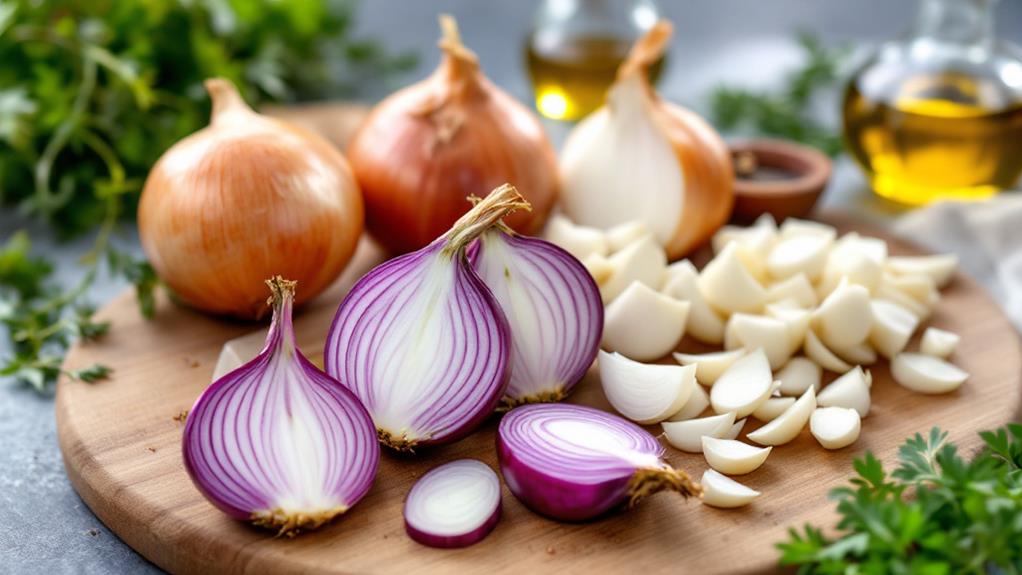
When comparing shallots and onions, you'll notice some key differences that can influence your cooking. Shallots are milder and sweeter in flavor than onions, making them perfect for dishes that require a delicate taste. Their cellular structure allows them to break down more easily during cooking, which is why they're often used to create foundational flavors in sauces and gourmet dishes.
In terms of nutritional content, shallots stand out by offering higher levels of vitamin B6, manganese, and folate compared to onions. These nutrients contribute to shallots' health benefits, supporting everything from metabolic processes to cellular repair. However, if you're watching your calorie intake, onions might be the better choice, as they contain around 40-45 calories per 100 grams, while shallots have 72-75 calories for the same amount.
Culinary uses also differ based on their physical characteristics. Shallots grow in clusters and have an oblong shape with thin skin, while onions grow as a single bulb with papery skin and come in a variety of colors like white, yellow, and red. These differences mean that shallots and onions can bring unique elements to your culinary creations, depending on your needs.



